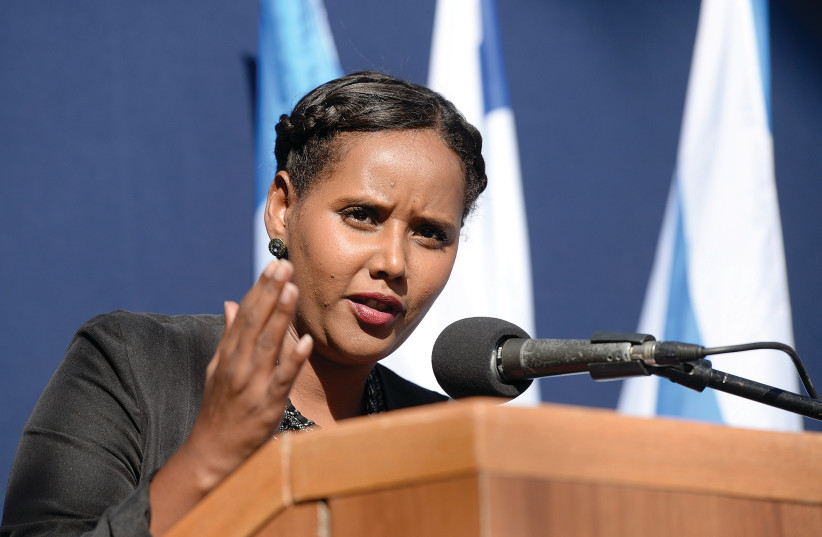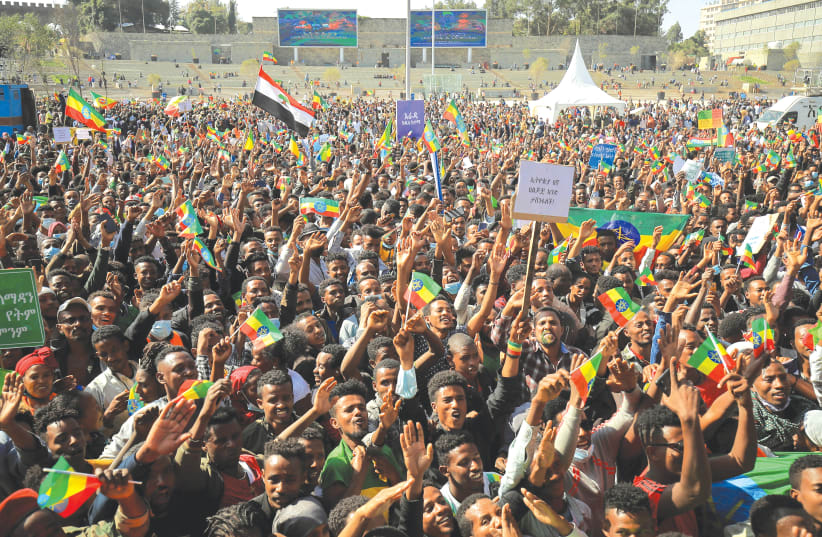News out of Ethiopia and its ongoing civil war in recent weeks has been fearful, with accounts of war crimes by all sides, a severe threat of famine in the north, and Tigrayan rebels fighting the federal government closing in on the capital, Addis Ababa.
With rebels between 230 km. to 325 km. from Addis Ababa, the Ethiopian government has called on residents of the capital to prepare to defend the city themselves, and has also begun to carry out forced conscription into the army.
With the situation so perilous, concerns have increased for the communities of Ethiopian Jews and descendants of Jews who remain in the country, with many Ethiopian-Israeli families becoming increasingly worried about the safety of their relatives.
Earlier this week, Interior Minister Ayelet Shaked and Aliyah and Integration Minister Pnina Tamano-Shata held a meeting with senior security officials and decided to expedite the immigration to Israel of those who remain with valid claims to move to Israel.
The Jerusalem Post understands that a plan being drawn up by the two ministries would see the arrival of those immigrants in a matter of weeks.


The war began a year ago in November 2020 when the federal Ethiopian army launched an attack against the Tigray region for holding regional elections after the central government had suspended national elections, supposedly due to the COVID-19 pandemic.
The federal army was initially successful but a counterattack by the Tigray People’s Liberation Front (TPLF) has left it reeling, with the latter now making serious inroads into the Amhara region, and is currently 325 km. by road from Addis Ababa.
The communities of Jews and descendants of Jews are located in two main areas. One is Gondar in the north, which is less than 200 km. from Tigray and where the TPLF came within 65 km. of the city around a month ago, before they were pushed back, and the other is Addis Ababa.
The precise number of people in these communities is unclear, although activists say there are 3,000 in Addis Ababa and 11,000 in Gondar.
The number of those remaining has been a matter of dispute for many years. In 2010, a list of around 9,500 people was drawn up and accepted by Israeli authorities, who were from the community previously known as Falash Mura but are now referred to as descendants of Jews.
The overwhelming majority of this group were of paternal Jewish descent, and, since their ancestors converted to Christianity at the end of the 19th century, are not eligible for aliyah under the Law of Return and were not included in the ruling of Rabbi Shlomo Amar in 2005 to bring to Israel matrilineal Ethiopian descendants of Jews.
Instead, they immigrate to Israel under family reunification laws approved through the Interior Ministry.
In 2015, the government passed Resolution 716 to bring all remaining members of this group to Israel, and around 4,500 have arrived since then.
The decision made earlier this week relates to the 5,000 remaining members of the community, and of them, those who have first-degree relatives in Israel and fulfil other conditions will be allowed to come to Israel in the coming weeks, sources close to Tamano-Shata have said.
Since the list was drawn up in 2010, another community claiming Jewish descent of 5,340 people from the Gojjam region has also requested to immigrate to Israel.
According to senior religious-Zionist rabbis such as Rabbi Yaakov Medan, Rabbi Re’em HaCohen and others, more than 90% of this group are of maternal Jewish descent, and these rabbis have called for them to be brought to Israel as well.
Activists say that natural growth of all of the community of descendants of Jews since 2010 accounts for the remainder of those seeking to come to Israel.
The consensus among various experts and activists appears to be that the security of these communities is not different from that of other Ethiopian civilians, something Kasaw Shiferaw, chairman of the Activists for the Aliyah of Ethiopian Jews group, generally agrees with.
He notes however that the proximity of Gondar to Tigray has meant that there is now a curfew in the city, while the army has established a base adjacent to a Jewish cemetery, meaning there is now no access to it for the community.
But a more pressing concern, Shiferaw notes, is the phenomenon of forced conscription, which has also affected the communities of Jews and descendants of Jews, and he says he has heard of four incidents in recent days in which members of these communities have been drafted into the army.
Setargew Amare, who moved to Israel from Ethiopia in 2008, said on Thursday that his brother and the husband of his niece were forcibly conscripted into the federal Ethiopian army two days ago.
He became concerned when he was unable to reach them by telephone, and spoke with his nephew, who told him what happened.
Danny Limor, a former member of the Mossad who was involved in the operation to bring the Beta Israel Ethiopian Jews to Israel in the 1980s, says he does not believe there is a specific danger in which the Jews and descendants of Jews would be persecuted by either the federal government or the TPLF due to their Jewish identity.
He notes that the TPLF was the dominant political party that ruled Ethiopia from 1991 to 2018 during which time the various Jewish communities did not suffer persecution.
The current government, in place since 2018, has had good relations with Israel and no record of persecuting its Jewish communities.
Limor said cautiously however that “during times of war, Jews can often become scapegoats,” and so did not rule out that these communities could still face dangers beyond that of other citizens.
He also noted specifically that in Addis Ababa there are between 750-800 people in the community of Jewish descendants who are at high risk since they are originally from Tigray, and said they have confined themselves to their homes due to fear of reprisals.
More broadly, the possibility that the TPLF will try to capture Addis Ababa means all of the city’s residents could get caught in the crossfire, including the communities of descendants of Jews, said Limor.
He also pointed out that earlier this week the US State Department ordered the departure of non-emergency US government employees and their family members from Ethiopia “due to armed conflict, civil unrest, and possible supply shortages.”
This gives a general indication of how dangerous the situation has become in the country, Limor said.
Joseph Feit, chairman of the Struggle to Save Ethiopian Jewry (SSEJ), which is providing aid to those in the communities of Jews and Jewish descendants and is closely monitoring the situation, says he does not believe the TPLF will try to capture Addis Ababa in the next month to six weeks.
What does trouble Feit particularly at the moment is the general welfare of these communities, particularly in Gondar, where he says they are among the poorest and most vulnerable sectors of society to start with.
He notes that 50% to 60% of children in those communities in the city, more than 500 children, are chronically malnourished.
The members of these communities are generally very poor, having left their ancestral villages in order to press their claims for immigration to Israel, and live hand to mouth through day-labor jobs, which have dried up since the civil war became more acute.
Food prices are rising for various reasons, while the war itself and COVID-19 have severely affected the economic situation in the city, meaning that those in the communities have less work opportunities and less ability to provide for their families.
Should the TPLF try to capture the city, Feit worries that the Jewish communities would be stranded and get caught in the cross fire.
He says the government needs to start efforts to bring those eligible to Israel immediately, since the Ethiopian central government would be unlikely to approve an emergency Israeli military operation.
That would mean transporting them to Addis Ababa first, which would entail risk due to the war, and would be logistically challenging, hence the need of the Israeli government to immediately begin working on the problem.
Speaking more broadly, Rabbi Dr. Sharon Shalom, chair for research of Ethiopian Jewry at the International Center for the Study of Ethiopian Jewry at Ono Academic College, denounces the fact that so many people from these communities still remain in Ethiopia.
He accuses a series of governments of failing to deal with the issue holistically, like other long-term problems, but instead “puts out fires” without satisfactorily addressing the problem.
Shalom says he is opposed to ongoing immigration on the basis of family reunification, saying that under this model “immigration will never end,” due to intermarriage among the community of Jewish descendants and the possibility of never-ending claims for family reunification.
Instead, he argues, all immigration from Ethiopia should be based on whether or not the individuals in question are of Jewish descent.
This he says must be done by convening a committee headed by kessim, the community’s spiritual leaders, and the community’s elders and leaders, together with members of the rabbinate and the Jewish Agency.
“The people who know who is Jew are the kessim... If they bring together the kessim and the elders and form a committee then they can say who is a Jew and who is not,” he said.
“As long as the kessim are not leading this effort the chaos will continue.”
